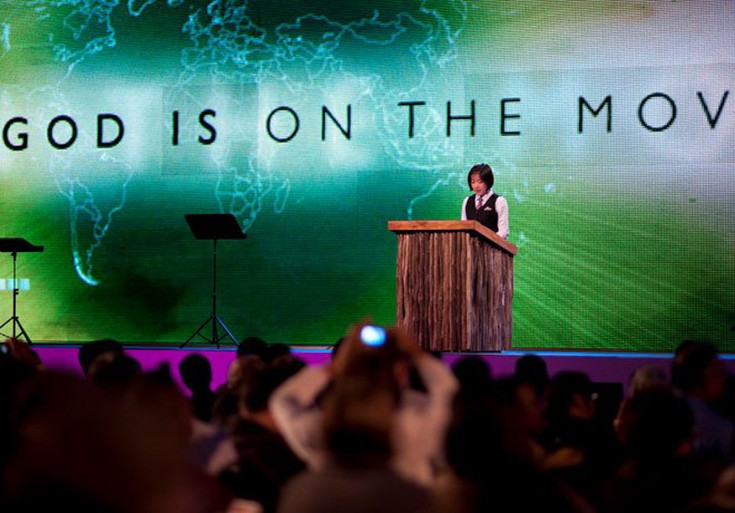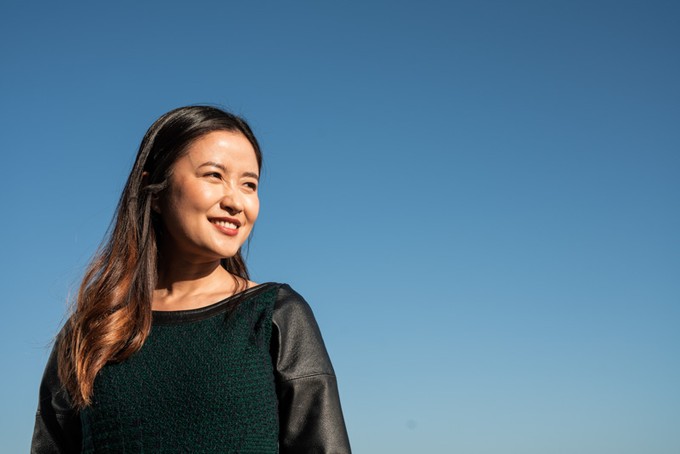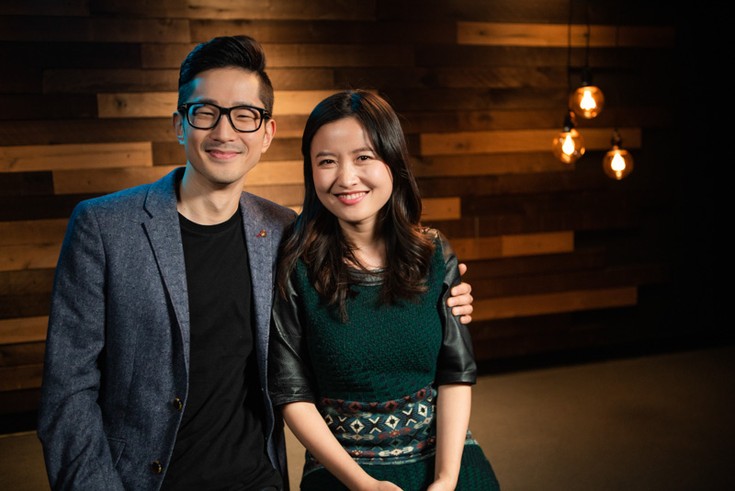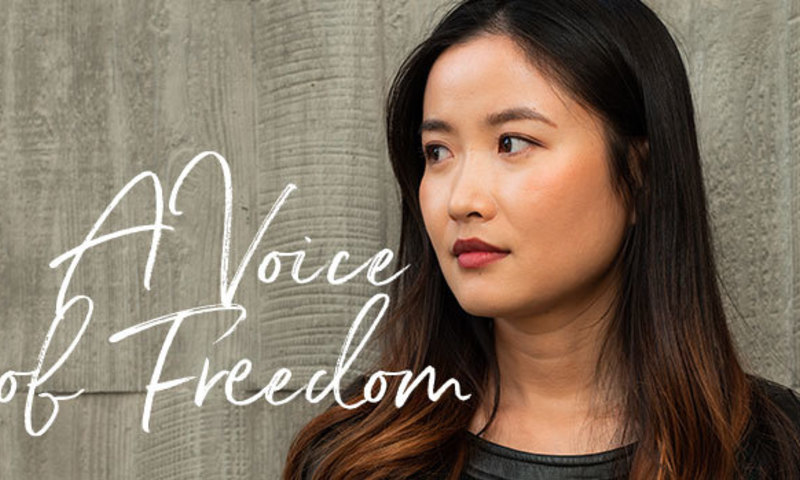Eight and a half years ago, a North Korean orphan walked onto a stage in South Africa, never imagining how the next 7 minutes would change her life.
Standing alone in front of more than 4,000 pastors, missionaries and Christian leaders, Sarah Chang lifted a quavering voice and began to tell her story. She spoke powerfully of persecution and heartbreak in her North Korean homeland and the grace and hope she had found in Christ, delivering an emotional testimony that would soon captivate tens of thousands of viewers around the world. As she stepped away from the podium to thunderous applause, it was clear to many in the audience — including Biola University President Barry H. Corey — that God had a remarkable plan for this young woman’s life.
Eight years later, in December 2018, Sarah again walked onto a stage — this time to receive her Biola University diploma, ready to take the next step in her unlikely journey of faith.
North Korean Roots
The trajectory of Sarah Chang’s life forever changed with her memorable speech that day in October 2010 at the Third Lausanne Congress on World Evangelization. Held in Cape Town, South Africa, the gathering brought together delegates from 198 countries to focus upon the advance of God’s redemptive work in the world. Within days, Sarah’s testimony became the conference’s most talked-about speech, garnering tens of thousands of views through a rapid spread on social media and reporting in news outlets such as Christianity Today.
At first, when she received the invitation to share her story, she thought she was going to speak at a small Korean church. But there she was, an 18-year-old high school student standing on a large stage in front of thousands of people from all over the world.
It was the first speech Sarah had ever given. She wasn’t even fluent in English at the time.
She began by introducing herself, reading the carefully practiced English translation of a speech she had originally written. She was born into a wealthy family, she continued. Her parents and many of her relatives worked for the government, her father an assistant to Kim Jong-il, former supreme leader of the Democratic People’s Republic of Korea.
Sarah was only 6 when her family escaped to China with the help of a hired broker. Her parents were motivated to escape the North Korean regime because they wanted their only daughter to experience freedom.
In North Korea, the Kim family were considered the supreme leaders and the North Korean people were expected to worship them like gods. If anybody said anything negative about the Kim dynasty or the government, they risked retaliation and imprisonment.
Sarah’s mother was imprisoned for a few months when she was pregnant with her second child and while in prison, she lost her baby. Sarah’s father was shocked by the government’s treatment of his wife, after so many years of loyal service. The family became determined to escape.
When they made it to China, one of their relatives took them to church and an American missionary eventually led her parents to Christ. But within months of their escape, Sarah’s mother passed away from leukemia while pregnant again with another child.
Her father became an impassioned believer, started studying theology and desired to become a missionary to North Koreans. They were in China for three years before a North Korean refugee reported her father to the Chinese police. He was deported and imprisoned in Korea for three years, but eventually escaped again to China. He continued to have an urgent desire to share the gospel and collected Bibles for distribution. When the North Koreans heard about his efforts to evangelize, they imprisoned him again in 2006.
From that time on, Sarah didn’t have any knowledge about what happened to her father, until much later she discovered he had been publicly executed.

Encountering Jesus
When Sarah’s father was still in prison, Sarah was adopted by a Chinese pastor’s family at age 11. As painful as it was to lose both her parents at such a young age, she said it wasn’t as painful as it was when her adopted family decided to immigrate to the U.S. and abandoned her in China.
“I think I was hurt more than when I lost my mom or my dad because when I lost my parents, I was too young,” Sarah said. “I [didn’t] realize ‘I don’t have parents’ because I [was] too young. But when I was adopted by [the] Chinese pastor’s family, I was 11 years old. ... They abandoned me, and there’s no reason. I didn’t do anything wrong and I was a good daughter for them. But just because they wanted to go to America, they abandoned me in China.”
With no explanation or understanding of why her adopted family left her in China, and as a result, no legal status, she had no other option but to go to the South Korean consulate in Beijing, where she stayed for more than a year before gaining entry into South Korea.
“I complained every day,” Sarah said, describing one of the darkest times in her life. She felt like her life was cursed, she said. She asked God why he would allow all of this to happen — to take away both her parents, to lose her dad because of the gospel, to be abandoned by a Christian family who had taken her in. But in the midst of her questioning, she experienced her first real encounter with Jesus, she said.
“One day, I saw Jesus in my dream,” Sarah said. “In my dream, he cried and he hugged me, and he said, ‘How much longer are you going to keep me waiting? Yes, you lost your earthly father, but I am your Heavenly Father, and whatever happened in your life before or in the future is all because I love you, and that’s all I planned, so just trust me and walk with me.’”
This dream was so vivid, so real, that Sarah couldn’t forget it. From that point on, she knew she was an adopted daughter of God and that she could place her trust in Jesus. She grew in faith as she started reading the Bible, meditating on Scripture and praying.
Biola Bound
In the aftermath of her Cape Town speech, Sarah was approached by Biola’s President Corey, who had been so stirred that he offered her an invitation to attend the university on a full scholarship.
Since she was little, her parents had wanted her to have a Christian education in the United States. But because she didn’t know any English, she was hesitant about accepting Corey’s offer to come to Biola on a full scholarship. And in fact, when Corey made the offer, he wasn’t sure he had the authority to do so.

With the help of administrators and staff, Sarah eventually enrolled at Biola in 2013. Before she started, she took a few classes at Los Angeles City College to boost her English competency, and later enrolled in Biola’s English Language Program. She wanted to learn everything she could about American culture and Western civilization, so she decided to major in social science, allowing her to take a variety of courses in history, political science and sociology.
“Sarah's journey brings me a special joy, given the tremendous hurdles she has overcome in life, and the ways she has been formed by this loving community of Christ-honoring, biblically centered education,” Corey said. “Handing Sarah her diploma more than eight years after I first met her as a teenage North Korean refugee in Cape Town, South Africa, will forever remain a profound moment for me.”
Fitsum Mulat, Biola’s director of international admissions, was pivotal in helping Sarah transition to life on campus, helping her navigate everything from housing to figuring out where she fit in and even dating.
“To me, this girl is nothing but a miracle,” said Mulat, who considers journeying with Sarah the highlight of her 22 years of working at Biola. “Everything that happened in her life. ... God has been truly faithful in her journey. ...I think sky’s the limit for her. She’s really a driven girl.”
Among the most life-changing elements of Sarah’s time at Biola was meeting her husband, Paul Chang (’15), a music performance major with an emphasis in percussion. He knew a little about Sarah before a mutual friend eventually introduced him to her. Paul was born in New Mexico but grew up in South Korea and served for two years in the military as mandated by the South Korean government. While in the military, he was trained in identifying North Koreans and also taught to dislike them. When he saw Sarah, he was surprised by her charm. He and Sarah have now been married for three years.
When Sarah reflects on the most important thing she gained at Biola, aside from meeting Paul, it’s learning the value of human beings, beginning with herself.
“Before I came to Biola, I never thought that I, as a person, that I’m a valuable person,” Sarah said. When she was in China, she hid her identity for over a decade and had no legal status. When she was in South Korea, though she studied well, spoke Korean fluently and became a classified citizen, people still treated her like a talbukja, a North Korean defector.
“But here, at Biola, ... all of my friends and professors — they know about my story, but they never treat me like a refugee but like a normal Biola student,” Sarah said. “All of my friends at Biola, they know my story, but they never treated me like a special person. For them, I’m just Sarah.”
One of Sarah’s favorite mentors at Biola was adjunct professor Lloyd Peckham, or “Uncle Lloyd,” as Sarah and her classmates fondly called him. Sarah considered Peckham not only as her teacher, but also her friend.
“One of the biggest growths in Sarah — my beloved student and friend — was in the building of friendships,” Peckham said. “She was open to growing with others in all areas.”
Looking Ahead
Sarah, 26, graduated in December and is now working for an entrepreneurial company that hopes to launch a skincare line, a venture Sarah has long been interested in. She still remembers how a visit to Sephora, the multinational personal care and beauty store, sparked her interest in makeup and skincare.
“‘Wow! This is a new world’,” Sarah said, recounting her reaction after walking into Sephora for the first time. She admits she never had a personal hobby or many interests since she didn’t have much time or money as a student, so she counts her dive into cosmetics as her first hobby. She started watching YouTube videos about makeup and even read books on the science behind good skincare.

The couple has been married for three years.
Her hope now is to gain experience in the beauty and lifestyle industry and potentially build her own business in the future with her husband.
When Robert Harp, director of strategic initiatives at Biola’s Crowell School of Business, heard about Sarah from Mulat, he knew he needed to meet her. When he learned more about Sarah, her heart for Korea and her desire to start a business, he encouraged her to pursue opportunities to develop her dreams. The Crowell School of Business gave her a full scholarship to attend the Praxis Academy in 2018 to fuel her entrepreneurial business idea.
“Sarah is a woman of courage, honor and compassion, and I fully expect her dream to come true — to have a business in the fashion and beauty industry — and one that honors God, flourishes and is a blessing to others,” said Harp, who nominated Sarah to serve as a delegate at Lausanne’s upcoming Global Workplace Forum in the Philippines, where he sits on the core leadership team and also serves in the Lausanne Movement’s Catalyst for Marketplace Ministry.
Though Sarah doesn’t exactly know what the future holds, she knows she and her husband both have a heart for Korea and want to see North and South Korea’s reunification. She hopes that whatever business she builds can be used to help the cause of orphans — motivated not only by her own experience of being an orphan but because she was deeply touched by what she experienced as a high school student when she visited an orphanage in India.
“I just hugged one of the orphans, and she started smiling and following me every second, every moment,” Sarah said, an experience that taught her that small gestures can make a huge difference in a person’s life. “She wanted to touch me, holding my hand; I can see how happy she is because of my touching, my smiling. Since that time, I realize ... just one hug, one smile, you can give him or her the whole world. You don’t need anything special.”
Sarah Chang, an adopted daughter of God, wouldn’t consider herself special, but has experienced an extraordinary life and is certainly one of a kind.
Correction: Sarah's husband Paul served in the military for two years, not one year, as stated in the print version of this article.
 Biola University
Biola University

.jpg)

